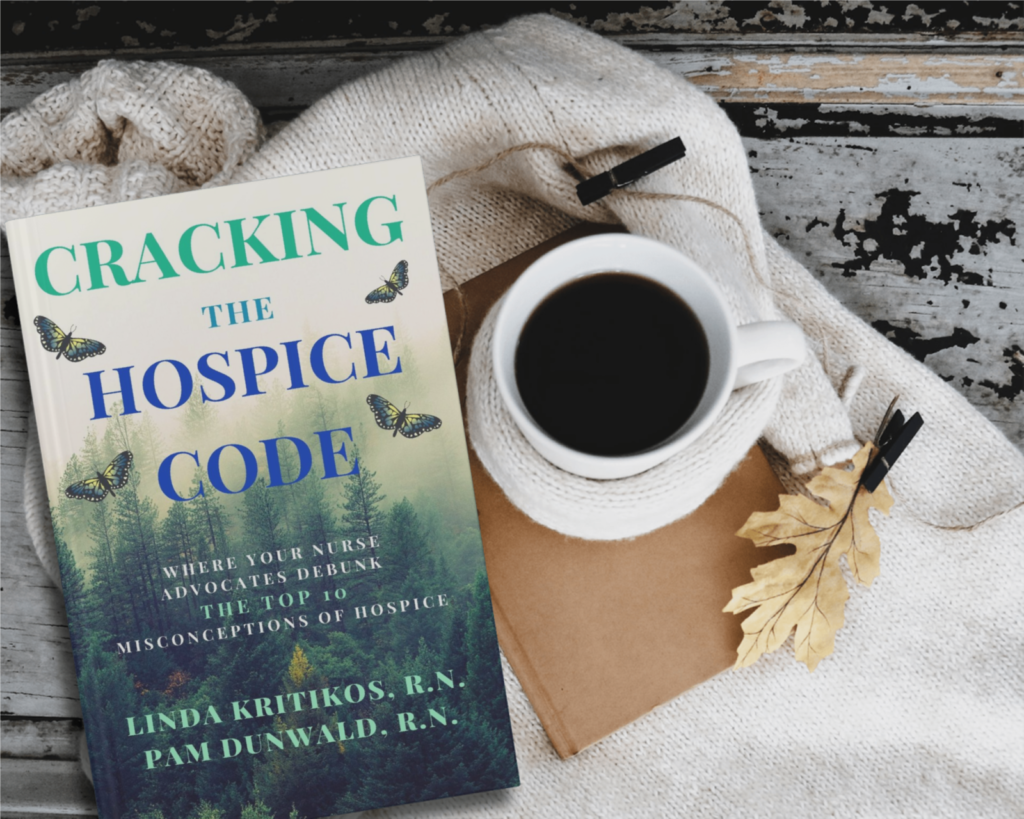Navigating grief and loss is a natural part of life. Coping and moving on can be a challenge. This can be exceptionally hard when caring for someone at the end of theirs. For caregivers and seniors alike, understanding how to cope with grief can make this challenging time more manageable. In this blog post, we’ll explore the grieving process, provide coping strategies, and share resources to support you and your loved ones through this emotional journey.

Navigating Grief and Loss: The Five Stages
Grief is personal and unique to each individual, yet it often follows five general stages identified by psychiatrist Elisabeth Kübler-Ross:
- Denial – This is the initial shock and disbelief that accompanies loss. It acts as a buffer to help us cope with overwhelming emotions. It is the first stage for a reason. I will never forget a letter I received several months after the death of her mother. I cared for her in hospice and this daughter was the primary caregiver.
Personal Story
The daughter, we will call her Cindy. Cindy was the primary caregiver for her mom. She had other family members that assisted but she accepted the role as main caregiver. I always tried to prepare the family I was working with to be prepared for what was to come. Denial was something that everyone goes through first. Not accepting the reality of the situation helps protect us from the worst. In order to be able to move on is to get to the final stage of acceptance.
Even though her mom was in hospice care, Cindy struggled with the fact that her mom will pass. Anytime I talked about the signs we were getting closer she didn’t want to listen.
About 2 weeks before her mom passed, I tried to prepare the family for my assessment that showed me she had begun the final stages before she would pass. Everyone goes through a pattern of change as the body prepares for death. No one goes through these stages in the same way but everyone will enter and pass through the physical changes prior to death.
I determined she was days away from passing. We have no crystal ball and cannot determine with any type of accuracy when someone will pass. That is not in our hands, however we know when it is getting close.
I mentioned to the daughter that she should spend as much time as she could with her mom. She expressed her desire to be with her when she passed. To be at her side. She had a short trip planned and I encouraged her not to go. She told me she was fine to go and felt her mom had plenty of time yet. She went on her 5-day trip and during that time her mom passed.
As mentioned earlier, several months after the passing of her mom, Cindy sent me a letter. I lived in her community, and she was able to find my address. It was a long 3-page letter that she said took her a long time to write because of her guilt she felt not being at her mom’s side when she passed.
She apologized to me for not hearing what I was telling her. She told me she wished she would have listened to me. She had been in denial and was now able to move past this stage and get to acceptance.
Each stage comes with powerful emotions that protect our mind from things we are not ready to deal with. Everyone has to go through these stages of denial in their own way.

2. Anger – Often directed at oneself or others, anger can stem from feelings of helplessness and frustration. During this stage it is very common to lash out at healthcare staff, God or the higher power you may believe in, and anyone else that you can rationalize that it may be “their” fault. You may question “why” a lot. Why did my spouse leave me alone? How am I supposed to keep going without my loved one? You may be very bitter. My mother-in-law went an entire year before returning to church after the loss of her husband.
She has since passed and in reading her diaries, she wrote this many times about why he had to leave and how she was so lonely without him.
3. Bargaining – This stage involves making deals or promises in an attempt to regain control or postpone the inevitable. Many prayers have been said offering themselves vs. their loved one to pass during times like this.
Another example may be dwelling on “What If” Scenarios: Someone might frequently think about how things could have been different if only they had acted differently. They might say, “If only I had insisted, they see a doctor sooner, maybe they would still be here.”
Lastly Seeking Alternative Solutions: The person might look for ways to reverse or mitigate the loss, such as consulting multiple experts or trying unconventional methods in hopes of a different outcome. For instance, they might explore every possible treatment option for a terminal illness, even those with little evidence of success.
In our book, “Cracking the Hospice Code”, we share the entire story of my in-laws coping with cancer and hospice care. They also went through the bargaining stage. They had heard of an Indian “healer” in Oklahoma and friends told them he had cured cancer from someone they knew. They shared with the family that they wanted to try. They shared the cost, and we said we would stand by them and agreed to let them try. It was not going to impact them too terribly with finances, so we didn’t see a big risk in trying. Our book shares the entire story and journey until my father-in-law passed.
4. Depression – Deep sadness and regret can emerge as the reality of the loss sets in. This is also a very powerful and emotional stage and people can stay in this stage for long periods of time. It is important that they get through this stage to acceptance to be able to move on and continue their life with passion and a renewed sense of purpose. Begin to enjoy life again. The loss will always be there. Fond memories and recollections replace the feelings of being down and depressed.
5. Acceptance – Finding a way to come to terms with the loss and learning to live with it. You never forget but you find yourself able to move on and look forward to what the rest of your life has in store. There is no right or wrong amount of time each person should spend in each stage. Everyone is different and will cope in different ways. The goal, however, is to get through all the stages and reach the level of acceptance.
Understanding these stages can help caregivers and seniors recognize and validate their feelings, leading to healthier coping mechanisms. Just knowing that it is normal to go through these stages at your own pace is comforting.

Coping as a Caregiver: Strategies for Support
Caregiving is an act of love, but it can be emotionally overwhelming. Here are some strategies for coping:
- Reach Out for Support – Join support groups or seek professional counseling to connect with others who understand what you’re going through. Many hospice agencies offer grief and loss support groups for their families as well as the community. My mother-in-law felt it was the support group that got her through.
She always told us we didn’t understand what she was going through. She felt being in a group of people experiencing the same thing comforted her.
Grief support groups are for all family members or friends that need support to get through the grieving process.
- Prioritize Self-Care – Take time for activities that bring you joy and relaxation. Regular exercise, healthy eating, and adequate sleep are crucial.
- Find Moments of Joy – Celebrate small victories and cherish happy memories with your loved ones.
Remember, it’s okay to ask for help. No one should face the burden of caregiving alone.
Supporting Seniors Navigating Through Grief and Loss: A Caregiver’s Guide
Seniors may experience grief differently, and as caregivers, we can support them through:
- Active Listening – Allow them to express their feelings without judgment or interruption.
- Creating Memory Spaces – Encourage them to create memory boxes or albums that celebrate the life and legacy of their loved ones.
- Ensuring Well-Being – Regular check-ins on their physical and emotional health can make a big difference.
By providing a comforting presence, you can help seniors process their grief in an accepting space.
The Essential Role of Open Communication
Honest conversations about grief within families can strengthen relationships and provide much-needed support. Encourage open dialogue and share your feelings with one another. Remember, vulnerability can foster healing and connection.
Seeking Professional Help and Resources
Sometimes, professional guidance is necessary. Here are some reputable resources for grief support:
- National Hospice and Palliative Care Organization – Offers support groups and counseling services.
- GriefShare – A network of support groups led by people who understand the grieving process.
- The Compassionate Friends – Provides support to families who have lost a child.
Utilizing these resources can empower you to move through grief with resilience and understanding.
Personal Journey: A Family’s Experience with Grief
When my mother-in-law lost her husband to cancer, her world changed overnight. Initially, she struggled with denial, unable to accept that he was gone. Anger soon followed. Angry at the world and the illness that took him. She tried bargaining, hoping for a miracle that would bring him back.
The depth of her depression was palpable, but with time, she found moments of acceptance. Daily walks brought her solace, and joining a grief support group provided companionship and understanding. By surrounding herself with supportive friends and family, she began to heal.
Her story is a testament to the power of love and resilience in the face of profound loss.
Conclusion: Finding Resilience in the Face of Loss
Navigating grief and loss is deeply personal experience, but it doesn’t have to be faced alone. By understanding the grieving process and employing coping strategies, caregivers and seniors can find a path to healing.
Remember, “Grief is not a sign of weakness, nor a lack of faith. It is the price of love.” We encourage you to share your own stories and seek out the support you deserve. Together, we can find hope and strength in our shared experiences.
Thank you for taking the time to stop by and spend a few minutes with us. Please know that this is a challenging time for everyone. We respect how difficult this time may be if you are in the middle of this process.
Thank you for stopping by and spending a few minutes of your time with us. Our goal is to provide education and resources to help you travel this unfamiliar journey you have taken or are planning to begin. We are here for you. You are not alone in this process. Feel free to reach out with questions or how we can help.
Pam and Linda,
Your Nurse Advocates
“Compassionate care for aging parents, peace of mind for the adult children.”
Resources
“Cracking the Hospice Code, Your Nurse Advocates Debunk the Top 10 Misconceptions of Hospice”
National Institute on Aging: Coping with Grief and Loss
Different Care Settings at End of Life





